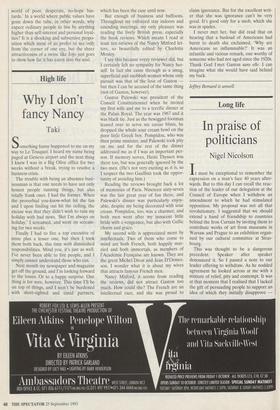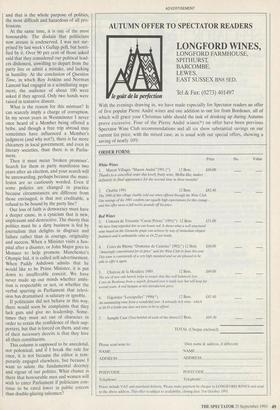Long life
In praise of politicians
Nigel Nicolson
It must be exceptional to remember the expression on a man's face 40 years after- wards. But to this day I can recall the reac- tion of the leader of our delegation at the Council of Europe when I withdrew an amendment to which he had stimulated opposition. My proposal was not all that revolutionary. I suggested that we should extend a hand of friendship to countries behind the Iron Curtain by inviting them to contribute works of art from museums in Warsaw and Prague to an exhibition organ- ised by our cultural committee at Stras- bourg.
This was thought to be a dangerous precedent. Speaker after speaker denounced it. So I passed a note to our leader offering to withdraw. As he nodded agreement he looked across at me with a mixture of relief, pity and contempt. It was at that moment that I realised that I lacked the gift of persuading people to support an idea of which they initially disapprove —
and that is the whole purpose of politics, the most difficult and hazardous of all pro- fessions.
At the same time, it is one of the most honourable. The disdain that politicians now arouse is undeserved. I was not sur- prised by last week's Gallup poll, but horri- fied by it. Over 90 per cent of those asked said that they considered our political lead- ers dishonest, unwilling to depart from the party line or admit a mistake, and lacking in humility. At the conclusion of Question Time, in which Roy Jenkins and Norman Lamont had engaged in a scintillating argu- ment, the audience of about 100 were asked if they agreed. Only two hands were raised in tentative dissent.
What is the reason for this mistrust? It can scarcely imply a charge of corruption. In my seven years in Westminster I never once heard of a Member being offered a bribe, and though a free trip abroad may sometimes have influenced a Member's judgment (and why not?), there is far more chicanery in local government, and even in literary societies, than there is in Parlia- ment.
Then it must mean 'broken promises'. Search for them in party manifestos two years after an election, and your search will be unrewarding, perhaps because the mani- festos are so cautiously worded. Even if some policies are changed in practice because circumstances are different from those envisaged, is that not creditable, a refusal to be bound by the party line?
Our loss of faith is democracy must have a deeper cause, in a cynicism that is new, unpleasant and destructive. The theory that politics must be a dirty business is fed by journalism that delights in disgrace and failure rather than in courage, originality and success. When a Minister visits a hos- pital after a disaster, or John Major goes to Monaco to help promote Manchester's Olympic bid, it is called self-advertisement. When Paddy Ashdown admits that he would like to be Prime Minister, it is put down to insufferable conceit. We have never made up our minds whether ambi- tion is respectable or not, or whether the verbal sparring in Parliament that televi- sion has dramatised is salutary or ignoble.
If politicians did not behave in this way, there would soon be complaints that they lack guts and give no leadership. Some- times they must act out of character in order to retain the confidence of their sup- porters, but that is forced on them, and one of their necessary deceits is that they love all their constituents.
This column is supposed to be anecdotal, not polemical, and if I break the rule for once, it is not because the editor is tem- porarily engaged elsewhere, but because I want to salute the fundamental decency and vigour of our politics. What chance is there that honourable men and women will wish to enter Parliament if politicians con- tinue to be rated lower in public esteem than double-glazing salesmen?



























































 Previous page
Previous page